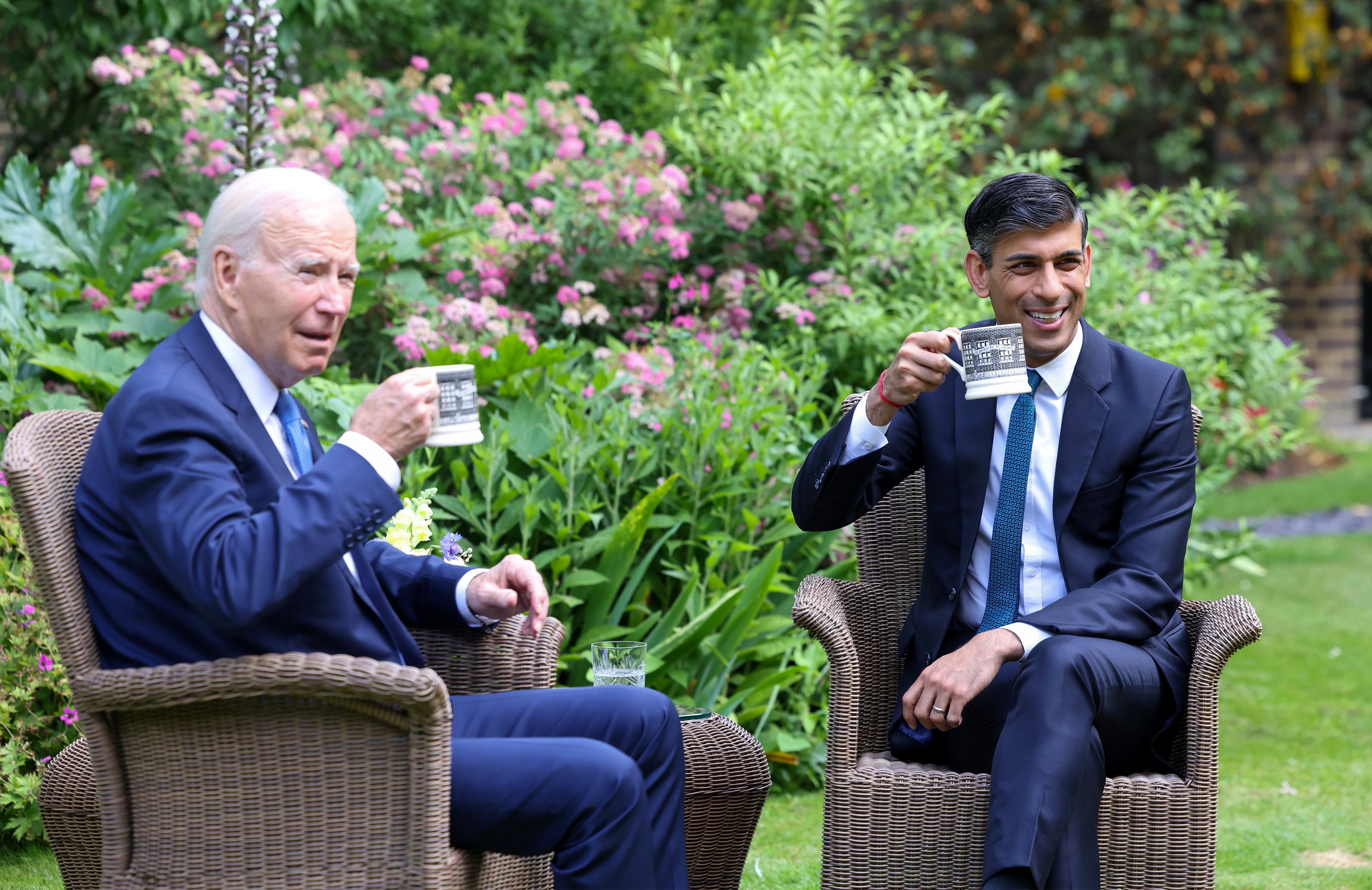The ‘special relationship’ between Biden and Sunak is not only intact – but ‘rock solid’
Editorial: As both prepare for the Nato summit in the Lithuanian capital of Vilnius later this week, they remain in accord on what the alliance’s aims should be

He may not have chosen to use the phrase “special relationship” during his short stay in the UK, but President Biden did do the prime minister the great honour, if not favour, of declaring their relations “rock solid”.
That is something that seemed unlikely even a few months ago, given Mr Biden’s well-known hostility to Brexit and, in particular, its impact on the Northern Ireland peace process. But circumstances, and a perhaps surprising rapport between the two leaders, have turned relations around.
Now, for one reason or another, they’ve been meeting almost monthly, and with no serious signs of discord. In the post-Brexit landscape, that is something to be cherished.
Mr Biden and Mr Sunak are obviously of different generations and have been on very different political journeys, though Mr Sunak’s well-known strong links to America seem to help the pair understand one another.
As politicians, they have a common experience in having to deal with the problematic legacy of a more charismatic, and still troublesome, predecessor. Mr Biden and Mr Sunak share a pragmatic outlook, a taste for deal-making, and, above all, a shared belief in the international rules-based system and the role of Nato.
As both prepare for the Nato summit later this week in the Lithuanian capital of Vilnius, they remain in accord on what Nato’s aims should be – the restoration of Ukrainian sovereignty and territory. Where there are differences, as over the use of cluster bombs, these are expressed candidly and openly – but do not affect a shared determination to resist modern Russian imperialism.
Other Nato allies, such as Spain and Germany, that have also understandably voiced their misgivings about these indiscriminate weapons of war have also not allowed their objections to weaken the overall strength of the Atlantic alliance.
All agree that Ukraine, once the war is over, could join Nato and that Sweden should accede to the alliance as soon as possible. The outlook for the summit is relatively bright: Russia isn’t winning and President Putin looks weaker.
On the climate crisis, too, the UK and US find themselves broadly on the same side. In what was a slightly brave move for the King, albeit no doubt on the formal advice of his prime minister, the usual ceremonials and formalities of lunch at Windsor were accompanied by “cordial” table talk about climate change and conservation, as Charles and the president were joined by John Kerry, the presidential envoy, and Grant Shapps, the energy secretary.
There was no evidence in the president’s short schedule in London that Mr Sunak is not interested in net zero, as his former minister Zac Goldsmith alleged recently. In terms of the soft diplomacy practised by the palace, it was a modest but useful triumph.
The great irony in this warming of Anglo-American relations is that it has come largely as a result of Mr Sunak’s successful efforts to “make Brexit work”, to use a phrase the prime minister, a confirmed Brexiteer, might not favour. Moving closer to Washington has meant moving closer to Brussels. So Mr Sunak got on with it.
The Windsor Framework was a masterly piece of renegotiation with the European Commission of a kind rarely achieved by any British premier. Now the UK is, hopefully, about to rejoin the Horizon Europe project, and a further source of irritation is about to be excised from the relationship.
Mr Sunak is being rewarded with a show of confidence in him on the part of the president, who plainly didn’t take Boris Johnson too seriously. The one area of policy where Mr Johnson did take a lead, Ukraine, has been maintained by Mr Sunak.
There’s also a broad UK-US consensus on China, the Middle East and the emerging challenges of Artificial Intelligence, and the coming months will be ones where the British have the opportunity from a position of relative diplomatic strength to exercise some influence over US policy.
That said, Mr Sunak and Mr Biden face elections next year and may not have quite as much chance to bump into one another and to move and deal with other questions. The most unfortunate aspect of the present relationship between America and Britain is that there is no chance of it developing in the sphere of trade.
Despite some piecemeal deals with individual American states (and arguably unconstitutional ones where international commerce is reserved to the federal government), there is no sign of the kind of ambitious transatlantic free trade deal that was so freely debated at the time of the EU referendum seven years ago.
Such is the protectionist nature of public opinion in America that it is impossible to see any deals being made, and certainly not if Keir Starmer is trying to make friends with Donald Trump.
Though nowhere near as instinctive, easy and warm an alliance as between, say, Ronald Reagan and Margaret Thatcher or Bill Clinton and Tony Blair, compared to Trump-Starmer, the Biden-Sunak relationship will seem like a golden age if the pair of them lose their respective general elections.






Join our commenting forum
Join thought-provoking conversations, follow other Independent readers and see their replies
Comments